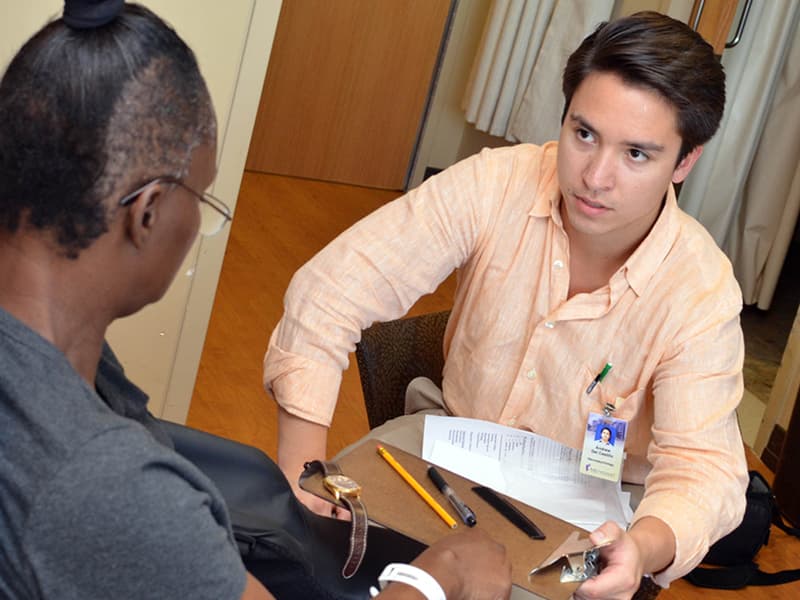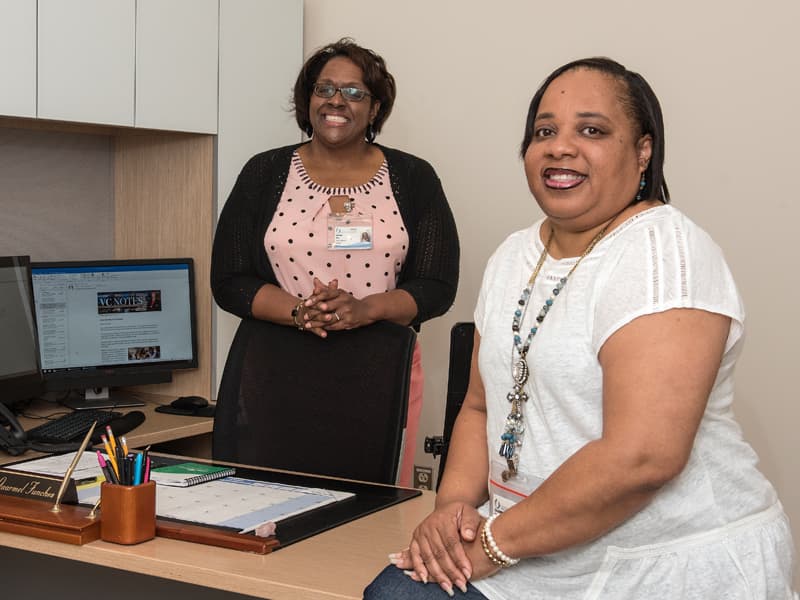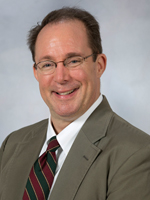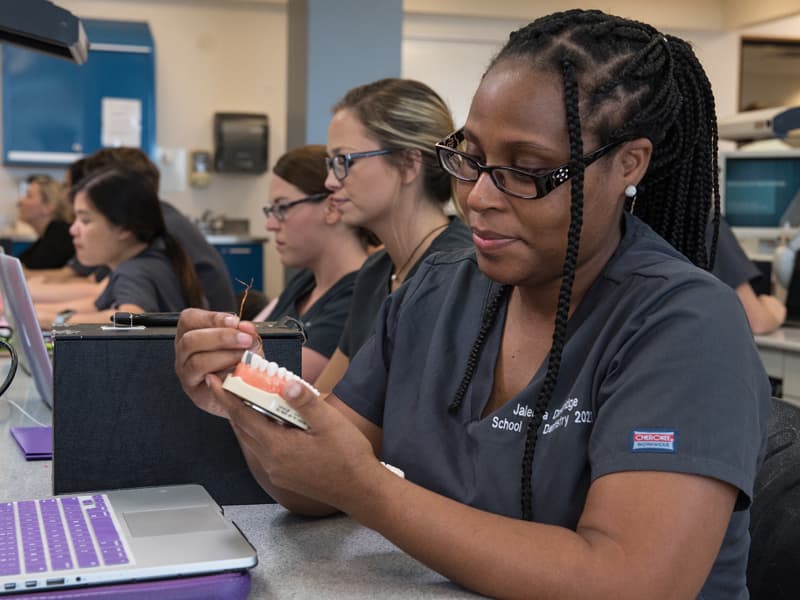Pipeline, enrichment program plant seeds of clout

Seven-and-a-half hours: That’s how long it takes to complete the Medical College Admission Test; but it can set the course of your life for at least the next seven or eight years.
Normally, that’s the length of time required to finish medical school and specialty training – as anyone who tackles the MCAT knows, including John Andrew Del Castillo, an aspiring physician whose scores, he thought, cried out for a do-over.
“I wanted to do better,” said Del Castillo, currently a psychometrist with Methodist Rehabilitation Center, “so I looked for any kind of extra help I could get.”
He found it in the University of Mississippi Medical Center’s Office of Health Careers Opportunity, which is committed to promoting diversity within the ranks of Mississippi’s health care professions, relying on such initiatives as MEDCORP IV, short for Medical Cooperative Program, a prep class for medical school or dental school applicants, who are required to take either the MCAT or the Dental Admission Test, respectively.
“When I applied to MEDCORP and was accepted, that was a fantastic day,” Del Castillo said. As fantastic, maybe, as the improvement in his scores on his second MCAT try in July.
“They were higher than I would have imagined,” he said.
Now living near Vicksburg, Del Castillo, a Jackson native whose father immigrated to the United States from Peru, is the type of student coveted by Health Careers Opportunity programs: those who are underrepresented in medicine, dentistry, nursing, pharmacy, graduate education and the health related professions, such as occupational therapy and physical therapy.

“We work with all types of students,” said Dr. Gaarmel Funches, director of the office, which transitioned to Academic Affairs from the former Division of Multicultural Affairs. “With our pipeline and enrichment programs, our mission is to enroll more of them in health professions schools, including minorities, as well as students from rural communities.
“We want to recruit students who, as future health care providers, look like many of the patients they will serve in this state, get them into the health profession schools and help decrease the workforce shortage.”
Apparently, the office is choosing its participants wisely: Around nine out of 10 students who take advantage of OHCO programs go on to pursue health care careers, Funches said.
Many of them chase a medical school degree, the purview of Dr. Stephen Manuel, assistant professor of family medicine and associate dean of admission in the School of Medicine.

“Health Careers Opportunity programs cultivate future physicians, cultivate future medical students, and give them the encouragement, the right skills, and the opportunity to chase their dreams,” said Manuel, using this agricultural analogy: “Farmers don’t just walk out and harvest the crops; they work the land first and make sure that plants get the right amount of water and nutrients to thrive.”
But medical students aren’t OHCO’s only crop. Courting, encouraging and educating students as young as elementary school age, its programs raise their awareness of all health care opportunities and foster, or even generate, certain career-related longings.
“Yearly, over 200 students are impacted by the many programs we offer,” Funches said.
For Del Castillo, the MEDCORP participant, that impact was more like a shock – in a good way. “When I was notified that my scores were in for my second MCAT, I was so nervous I couldn’t look at them for almost 12 hours,” he said.
“And then I immediately called my mom.” Del Castillo’s original score for the MCAT’s biology/biochemistry section was in the 45th-50th percentile range, he said; post-MEDCORP, it was in the 75th.
As for the chemistry/physics section, his rank shot up from the 30th to the 87th percentile, he said. “It was my highest section.”
For now, he plans to continue working in Methodist Rehab’s neuropsychology department. But he has reapplied to medical school and is hoping to get an admissions interview based on his latest MCAT results.
“MEDCORP not only helped me prepare for the MCAT, the program also provided facilities for studying,” Del Castillo said. “And I received the benefit of the Kaplan instruction,” he said, referring to the prestigious, and expensive ($2,499 for the MCAT), test prep company.
“It provided me with materials I didn’t have before I took the test the first time, and access to professors. I got to sit down with doctors and medical students in the cafeteria. It kept me more sane and healthy. And it made the idea of going to medical school seem more realistic.
“It was like, ‘I’m going to be here soon.’”

Jaleesa Dandridge is here already – as a first-year student in the School of Dentistry, the beneficiary of another OHCO program, Pre-Matriculation, or PRE-MAT.
Designed for future dental or medical students, PRE-MAT is a compact, six-week three-course summer serving of gross anatomy, histology and biochemistry, polishing the participants’ competence in those three critical areas before their first year of actual classes.
“Before PRE-MAT, I had taken a practice [Dental Admission Test],” said Dandridge, a native of Thomastown in rural Leake County, “and it scared me.” She found her courage in the classrooms and labs PRE-MAT opened to her.
“It has helped me, definitely,” she said. “Right now, I’m having some of the same courses I had in PRE-MAT. I’m prepared, because I’m seeing them for the second time.”
But PRE-MAT and MEDCORP IV are just a couple of islands of opportunity in the sizable OHCO atoll. In fact, the MEDCORP name alone encompasses several distinct offerings.
MEDCORP DIRECT, for one, provides special consideration for medical school admission to a college student who has completed the sophomore year, who intends to train here and “who has a heart for serving in underserved areas,” said LaFreda Sias, project manager for OHCO, who helps Funches recruit the state’s public, private and parochial school students for her division’s programs.
Two other initiatives, MEDCORP I and MEDCORP II, are on hiatus because of suspended federal funds. The Medical Center was able to sustain MEDCORP III (MCAT and DAT prep for pre-junior year college students) and its cousin, MEDCORP IV (for veteran test-takers seeking to improve their scores).
“Dr. LouAnn Woodward and Dr. Ralph Didlake have been instrumental in making sure the pipeline programs are sustained and supported by the institution,” said Funches, referring to, respectively, the vice chancellor for health affairs and the associate vice chancellor for academic affairs.
Some other OHCO approaches are trying to win much younger hearts, including STEP – for “Science Training and Enrichment Program” – a menu of enrichment in math, science and critical thinking for economically and academically disadvantaged students in grades six through eight, who are served at the UMMC campus on Saturdays.
“It exposes them, for instance, to dissection,” Sias said. “It’s taught by a retired high school science teacher who leads them in, say, a study of the kidney, or another organ or body system.
“Such pipeline programs create a confidence, a familiarity, for the students.”
OHCO does not create confidence in a vacuum; the division works well with others, including the Mississippi Rural Physicians Scholarship Program and Dr. Wahnee Sherman, executive director; and the Health Equity Leadership Initiative, which exposes underrepresented males, ages 17 to 25, to health professional training, under the direction of Dr, Juanyce Taylor, chief diversity and inclusion officer and professor.
For the Medical Center’s professional schools, the value of OHCO’s roster of programs can be measured in Del Castillo’s words, which can be taken as an endorsement, not only of MEDCORP IV in particular, but also of the division’s work in general.
“I’ve applied to other medicals schools,” he said, “but this is where I grew up, and knowing they care enough to get me to this point really makes me want to go to school here.”

